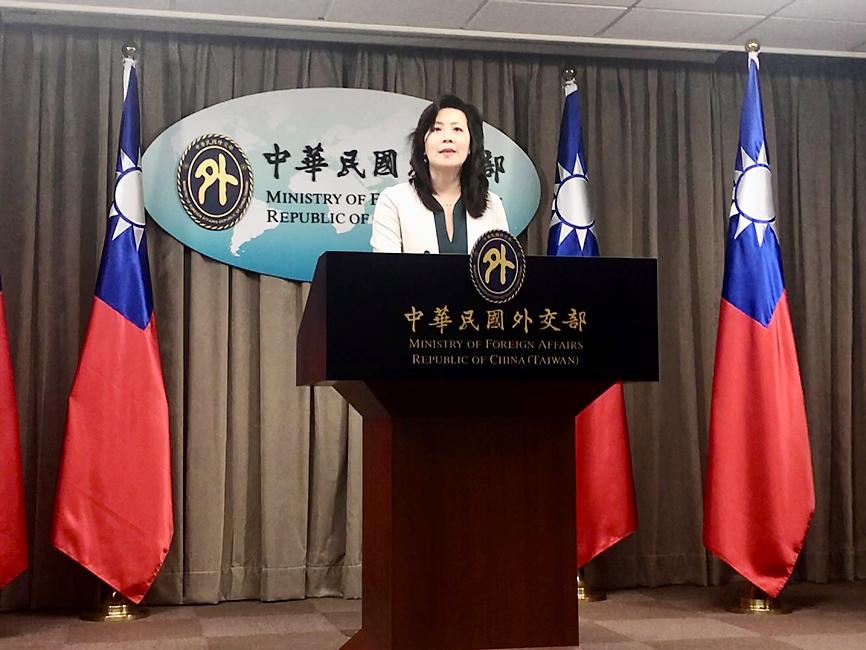A representative office is set to open in Somaliland at the end of this month, at the earliest, the Ministry of Foreign Affairs (MOFA) said yesterday amid reports that Beijing is sending a diplomatic delegation to the east African country.
The ministry on July 1 announced that Taiwan and Somaliland would establish representative offices, following a report by the Somaliland Chronicle Web site.
It said at the time that the two nations did not plan to establish formal ties.

Photo: Lu Yi-hsuan, Taipei Times
Somaliland President Muse Bihi Abdi has instructed close confidants to explore the possibility of “mutual recognition between Taiwan and Somaliland,” the Somaliland Chronicle reported on Monday, citing sources speaking on condition of anonymity.
He had also ordered a close examination of the US’ Taiwan Allies International Protection and Enhancement Initiative (TAIPEI) Act of 2019, which encourages the US government to increase economic, security and diplomatic engagements with nations that have enhanced relations with Taiwan, the Web site said.
Bihi has refused to meet Chinese Ambassador to Somalia Qin Jian (覃儉), who has been in Hargeisa, the capital of Somaliland, since Sunday, on his third visit this year, it reported.
A delegation of high-ranking diplomatic officials from Beijing was due to arrive in Somaliland, possibly as early as today, the Web site reported.
Asked about Somaliland’s plans, as reported by the Web site, ministry spokeswoman Joanne Ou (歐江安) told a news briefing in Taipei that the ministry would not comment on opinions of anonymous sources.
Taiwan and Somaliland maintain effective communications, and their alliance is built on their shared values of protecting freedom, democracy and human rights, the spokeswoman said.
Taiwan’s representative office in Hargeisa is set to be formally established at the end of this month or early next month, although the plan could change due to the COVID-19 pandemic, she said.
While Somaliland is not recognized by most countries, Ou said that it has been independent since 1991.
In other diplomatic news, the ministry is preparing to reopen the Taipei Economic and Cultural Office in Guam, which had been closed in 2017 for budgetary and personnel reasons.
The office is scheduled to be opened at the end of this month or early next month, Ou said at the briefing.
Office of Parliamentarian Affairs Deputy Executive Director Paul Chen (陳盈連) is to become the office’s director, she said.
The ministry is negotiating with Washington, as Guam is a US territory, on related matters, she added.

Taiwan is stepping up plans to create self-sufficient supply chains for combat drones and increase foreign orders from the US to counter China’s numerical superiority, a defense official said on Saturday. Commenting on condition of anonymity, the official said the nation’s armed forces are in agreement with US Admiral Samuel Paparo’s assessment that Taiwan’s military must be prepared to turn the nation’s waters into a “hellscape” for the Chinese People’s Liberation Army (PLA). Paparo, the commander of the US Indo-Pacific Command, reiterated the concept during a Congressional hearing in Washington on Wednesday. He first coined the term in a security conference last

Prosecutors today declined to say who was questioned regarding alleged forgery on petitions to recall Democratic Progressive Party (DPP) legislators, after Chinese-language media earlier reported that members of the Chinese Nationalist Party (KMT) Youth League were brought in for questioning. The Ministry of Justice Investigation Bureau confirmed that two people had been questioned, but did not disclose any further information about the ongoing investigation. KMT Youth League members Lee Hsiao-liang (李孝亮) and Liu Szu-yin (劉思吟) — who are leading the effort to recall DPP caucus chief executive Rosalia Wu (吳思瑤) and Legislator Wu Pei-yi (吳沛憶) — both posted on Facebook saying: “I

Sung Chien-liang (宋建樑), who led efforts to recall Democratic Progressive Party (DPP) Legislator Lee Kun-cheng (李坤城), was released on bail of NT$80,000 today amid outcry over his decision to wear a Nazi armband to questioning the night before. Sung arrived at the New Taipei District Prosecutors’ Office for questioning in a recall petition forgery case last night wearing a red armband bearing a swastika, carrying a copy of Adolf Hitler’s Mein Kampf and giving a Nazi salute. Sung left the building at 1:15am without the armband and covering the book with his coat. Lee said today that this is a serious

A mountain blaze that broke out yesterday morning in Yangmingshan National Park was put out after five hours, following multi agency efforts involving dozens of fire trucks and helicopter water drops. The fire might have been sparked by an air quality sensor operated by the National Center for High-Performance Computing, one of the national-level laboratories under the National Applied Research Laboratories, Yangmingshan National Park Headquarters said. The Taipei City Fire Department said the fire, which broke out at about 11am yesterday near the mountainous Xiaoyoukeng (小油坑) Recreation Area was extinguished at 4:32pm. It had initially dispatched 72 personnel in four command vehicles, 16